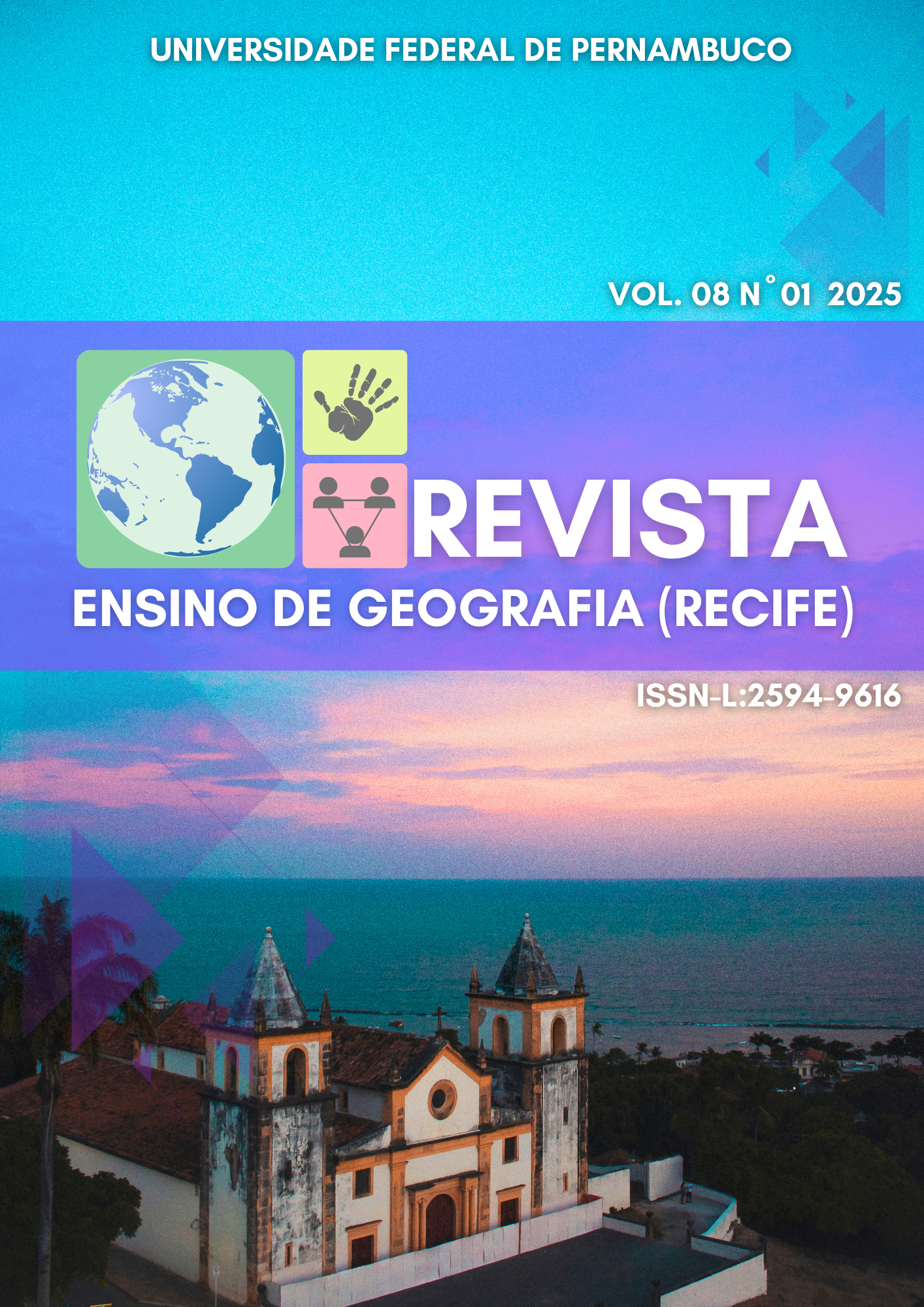Tribute to Ziraldo: the book “Lição de Geografia” and Universal Design for Learning (UDL) for teaching physical geography from the perspective of Inclusive Education
DOI:
https://doi.org/10.51359/2594-9616.2025.265831Keywords:
geography teaching, landforms, literature, Inclusive Education, ZiraldoAbstract
This article was born out of the desire to pay tribute to Ziraldo Alves Pinto, or Ziraldo, a memorable Brazilian writer who died in April 2024. However, the question was how to pay tribute to him. It was then that the decision was made to do so based on the approach to Geography, the author's area of training and interest, working with Ziraldo's book “Lição de Geografia” and highlighting his important role both for the country's literature and society and for the teaching of geographical content at school, especially physical geography. Thus, at the same time as paying tribute to Ziraldo, the aim is to present some teaching boards built as adaptations of the landforms portrayed in “Lição de Geografia”; the adaptations were designed to inspire the teaching of Geography from the perspective of inclusive education, and were made according to the Universal Design for Learning (UDL) approach. Another objective is to report on the dialogues and validation of the adaptations and on the potential of the literature in this task. This stage, systematized in the results, took place in 2024, in partnership with students on the morning shift of a course in Geography at the State University of Londrina.
References
BATISTA, T. S.; VASCONCELOS, T. C.; ARAUJO, R. W. V.; TRAVASSOS, W. de C.; SILVA, M. G. da; SANTOS, R. M. B. dos. Desenho universal para aprendizagem (DUA) no ensino de estudantes com transtorno do espectro autista (TEA): desafios e possibilidades. Anais do V CINTEDI... Campina Grande: Realize Editora, 2024. Disponível em: https://editorarealize.com.br/artigo/visualizar/108116. Acesso em: 04 fev. 2025.
BRANCO, A. P. C.; MARQUES, A. C.; JUSTINA, A. R. P.; CAPELLINI, V. L. F. M. Currículo flexível e o Desenho Universal na Aprendizagem - DUA: desdobramentos para a aprendizagem cooperativa. Revista da Faculdade de Educação - Vol. 40, 2024. Disponível em: Acesso em: https://periodicos.unemat.br/index.php/ppgedu/article/view/12680. 04 fev. 2025.
FIERZ, M. M. A teoria do equilíbrio dinâmico em geomorfologia. Geousp – Espaço e Tempo (Online), v. 19, n. 3, p. 605-629, mês. 2016. Disponível em: URL: http://www.revistas.usp.br/geousp/article/view/107614. Acesso em: 04 fev. 2025.
GUERRA, A.T. Dicionário Geológico-Geomorfológico. 8. ed. - Rio de Janeiro: IBGE, 1993. 446. p.
HACK, J. T. Interpretation of erosional topography in humid temperate regions. American Journal of Science, Bradley, v. 258, p. 80-97, 1960.
TRADUTOR BRAILLE. Tradutor Braille, 2025. Disponível em: https://www.tradutorbraille.com.br/. Acesso em 04 fev. 2025.
ZIRALDO. Lição de Geografia. São Paulo: Melhoramentos, 1999, 24p.
ZIRALDO. O Menino Maluquinho. 28ª ed. São Paulo: Melhoramentos, 1988.
ZIRALDO. Uma professora muito maluquinha. São Paulo: Melhoramentos, 1995.
ZIRALDO. Vovó Delícia. São Paulo: Melhoramentos, 1997. 80 p.
Downloads
Published
How to Cite
Issue
Section
License
Copyright (c) 2025 Vitor Colleto dos Santos, Eloiza Cristiane Torres

This work is licensed under a Creative Commons Attribution 4.0 International License.
Authors who publish with this journal agree to the following terms:- Authors retain copyright and grant the REVISTA ENSINO DE GEOGRAFIA (RECIFE) right of first publication with the work simultaneously licensed under a Creative Commons Attribution NonCommercial International 4.0 (CC BY-NC) that allows others to share the work with an acknowledgement of the work's authorship and initial publication in this journal.
- Authors are able to enter into separate, additional contractual arrangements for the non-exclusive distribution of the journal's published version of the work (e.g., post it to an institutional repository or publish it in a book), with an acknowledgement of its initial publication in this journal.
- Authors are permitted and encouraged to post their work online (e.g., in institutional repositories or on their website) prior to and during the submission process, as it can lead to productive exchanges, as well as earlier and greater citation of published work.



